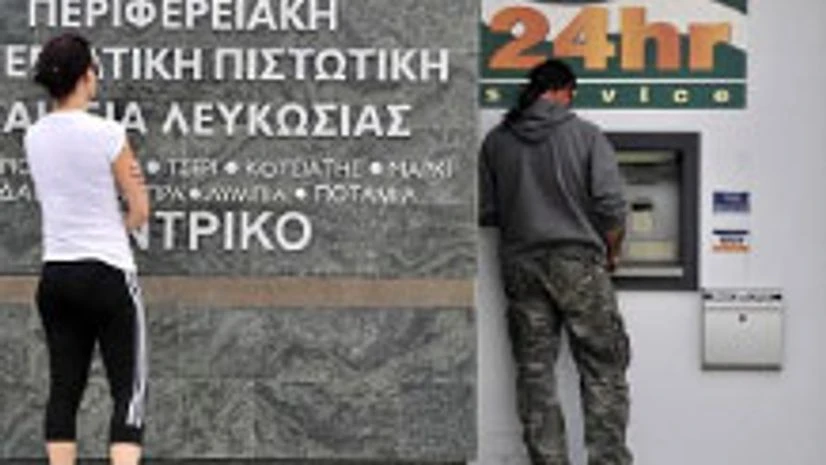As Cyprus scrambles to stave off a bankruptcy of its banks and a possible exit from the single currency, the euro group has expressed readiness to discuss a new proposal regarding implementation of a 10 billion euros ($13 billion) bailout for Nicosia offered by EU and IMF.
The new plan, which was offered here last night, is an alternative to the controversial bank levy proposed initially to raise up to 5.8 billion euros ($7.9 billion), a main condition to receive the bailout, which was overwhelmingly rejected by Cyprus' Parliament on Tuesday.
The bank levy plan, which envisaged a one-off tax of 6.75% on bank deposits between 20,000 euros and 100,000 euros and 9.9% tax above that level, is now unlikely.
Also Read
There will be no revised version of the tax in the new proposal, Parliament President Yiannakis Omirou was quoted as saying in media reports.
A central element of the 'Plan B' is the setting up of a 'national solidarity fund', to raise the amount demanded by the international donors by pooling resources from the island's Orthodox Church, pension fund, wealthy citizens and foreign investors.
It will be used to recapitalise banks and to repay some of the government debts.
Meanwhile, rating agency Standard & Poor's further downgraded the credit rating of the island nation to 'CCC' from 'CCC+', both junk status, in view of the likelihood of a bankruptcy.
President of the euro group Jeroen Dijesselbloem said after an emergency conference call of the euro-zone finance ministers that the "group stands ready to discuss with the Cypriot authorities a draft new proposal, which it expects the Cypriot authorities to present as rapidly as possible".
On the basis of an analysis of the situation by the 'Troika', the euro group would be prepared to continue negotiations on an adjustment programme, "while respecting the parameters defined earlier by the euro group", Dijesselbloem said in a statement after the conference call.
The Troika comprises of experts of the European Commission, the International Monetary Fund (IMF) and the European Central Bank (ECB).
Dijesselbloem sought to limit the damage to depositor confidence done by the finance ministers' initial decision on Saturday to levy bank deposits up to 100,000 euros with a 6.75% tax.
"The euro group reaffirms the importance of fully guaranteeing deposits below 100,000 euros in the EU," the statement said.
The euro area member states "continue to stand ready to assist the Cypriot people in their reform efforts and to ensure the stability of the euro area as a whole", the statement said.
The Cypriot government led by President Nicos Anastasiades is under mounting pressure to draft a legislation on the new proposal and to get it passed by Parliament in Nicosia.
A vote on the legislation, which was scheduled for Thursday, has been postponed to Friday.
The European Central Bank on Thursday threatened to cut off its emergency financial lifeline to the island's banks if a credible 'Plan B' is not approved by Monday.
This would mean that some of the major banks, which have been depending on the ECB's emergency liquidity assistance, will run out of cash when the banks reopen on Tuesday after a week-long closure ordered by the government.
In Brussels, a European Commission spokesman said the 'Troika' team currently in Nicosia, will closely examine the Cypriot government's new proposal later in the day.

)
